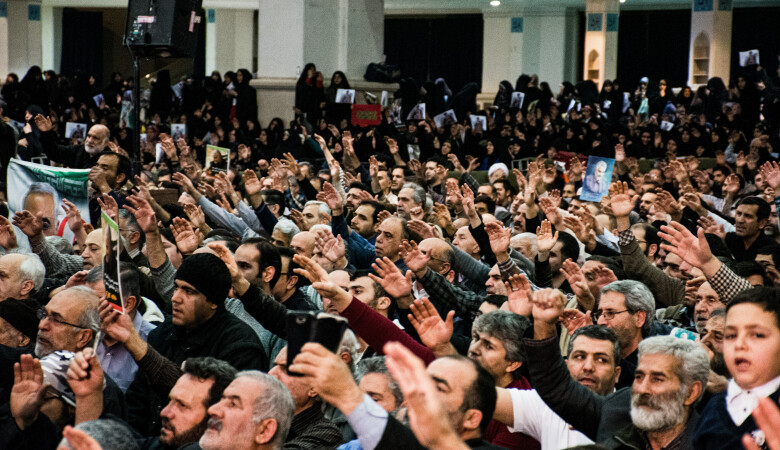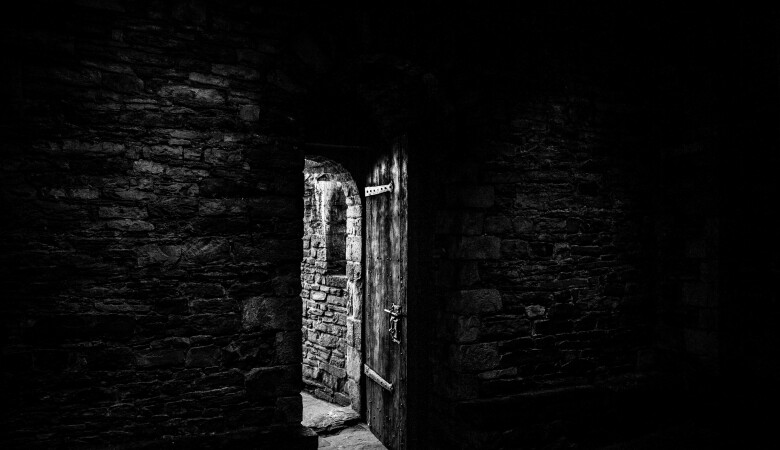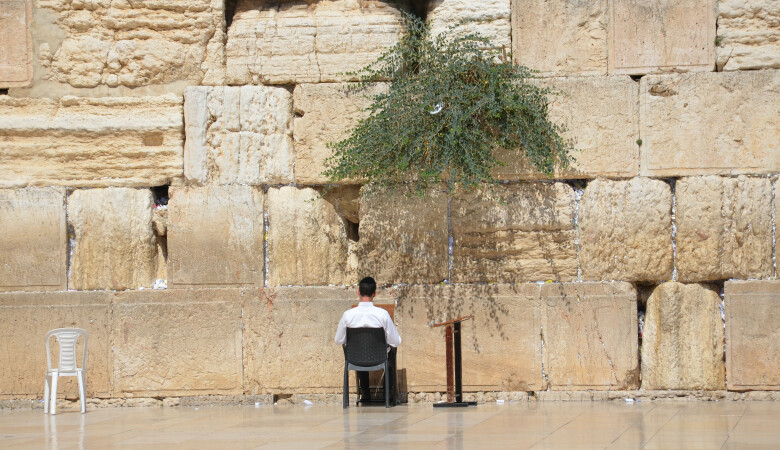Series: Mark
The Prophesied Sufferings of Elijah and of Christ (Mark Sermon 43)
February 26, 2023 | Andy Davis
Mark 9:9-13
Deity of Christ, Prophecy, Atonement
Scripture, in its prophetic nature, reveals the sufferings of the messengers of the Kingdom of God and the centrality of the cross for salvation.
- SERMON TRANSCRIPT -
Turn in your Bibles now to Mark 9. We continue our studies here in Mark 9:9-13, and as I look at this text, indeed, look at every text in the gospel of Mark, I come again and again to the centrality of the cross of Jesus Christ. The cross of Christ is the absolute center of the Christian faith. The Apostle Paul made this plain again and again in so many of the things that he wrote. He said in 2 Corinthians 2:2 , “I resolved to know nothing while I was with you, except Jesus Christ and Him crucified.” He said later in that same epistle, 1 Corinthians 15:3, "for what I received, I passed onto you as a first importance that Christ died for our sins According to the scriptures." He said in Galatians 6:14, “May I never boast except in the cross of our Lord Jesus Christ, through which the world has been crucified to me, and I to the world." But Paul also made it plain that the cross is a stumbling block. 1 Corinthians 1:23-24, "We preach Christ crucified, a stumbling block to the Jews, foolishness to the Gentiles, but to those whom God has called both Jews and Greeks, Christ, the power of God and the wisdom of God.”
Why was the cross such a stumbling block, especially to the Jews? It had to do with Jewish expectations of a glorious messianic kingdom. God had predicted a glorious kingdom established by the Son of David, the Messiah, and that Messiah would reign on David's throne establishing and upholding it, from that time on and forever [Isaiah 9]. His kingdom would extend from shore to shore as Psalm 72 makes it plain, and his enemies would lick the dust at his feet and all the nations’ Gentiles would serve him. The apostles were completely convinced that Jesus was indeed the Christ, the Son of David. Peter had spoken for all of them on that matter. In Mark 8:29, Jesus said, “'What about you? Who do you say that I am?’ And Peter answered, ‘You are the Christ.’" The apostles believed that Jesus would reign in Jerusalem on David's throne and that the arrogant Romans would finally be crushed under his awesome power. They're utterly convinced that this kingly reign was imminent. Some of them indeed were angling for positions of power in his throne room, but they had no conceptions of the cross, the need for the Messiah, the Son of the living God, to die a bloody shameful and cursed death on their behalf.
They stumbled over that. So Jesus had to establish this in their minds again and again, there in Caesarea Philippi. He began the process of instructing his disciples accurately on what had to happen. Mark 8:31-32, "He then began to teach them that the Son of Man must suffer many things and be rejected by the elders, chief priest and teaches of the law and that he must be killed. And after three days rise again." He spoke plainly about this. As a matter of fact, we're told in Matthew's Gospel that He began a consistent pattern of teaching on this theme. That's when it started, and it was again and again and again, He taught them about this. We see it again in Mark's Gospel in Mark 10: 32-34, “They were on their way up to Jerusalem with Jesus leading the way, and the disciples were astonished while those who followed were afraid.” Again, He took the twelve aside and told them what was going to happen to him. ‘We're going to Jerusalem’, he said, ‘and the son of man will be betrayed to the chief priest and the teachers of law. They will condemn him to death and will hand him over to the Gentiles who will mock him and spit on him, flog him and kill him. Three days later he will rise.’"
This caused their minds to reel. It just seemed inconceivable that Jesus would be rejected by his own people, condemned by the Romans and die on a Roman cross there at Jerusalem. Jesus had walked on water, spoken to the wind and the waves, and they had obeyed him. He had driven out a legion of demons with a word, and they obeyed him with a clear fear of him there. There was literally nothing He could not do. How then could He die? How could He be rejected and killed? Peter had spoken for all of them there at Caesarea Philippi, “Never Lord.” He said, “This shall never happen to you.”
Then after that, as we've noted, comes the Mount of Transfiguration, I believe, to re-establish his transcendent glory in the minds of his apostles. He took Peter, James and John up a high mountain, and there He was transfigured before them. His clothes became dazzling, white, whiter than anyone in the world could bleach them. It is clear that He does that to make their confidence in his glory firm and stable, given the message of the cross that they're now being schooled in. The stunning glory of Jesus Christ blinded their eyes. They could be no doubt of the absolute supremacy of his person. Then Moses and Elijah came to confirm his glory. But as they talk together, Luke tells us the topic was his imminent death and they spoke about his departure, his exodus, which He was about to bring to fulfillment in Jerusalem. Peter still cannot comprehend the need for the cross before the glory of the kingdom. He did not understand that Christ's blood shed on the cross was essential to redeem his sinful people from the curse of God that they had earned by their violation of his holy laws to bring his people wholly and pure into the kingdom of God. They didn't understand that and that there could be no other way than that, no other way than the cross of Christ and His atoning blood shed on the cross.
Peter up there on the Mount Transfiguration wants to stay there and bask in the moment. Peter said to Jesus, "Rabbi, it is good for us to be here. Let us put up three shelters, one for you, one for Moses, one for Elijah.” He did not know what to say. They were so frightened. I talked to the staff this week about this and I said, "Do you see what's going on with Peter? What was the plan? Is he going halfway down the mountain to get some brushwood and some sticks and lean them against each other to make a temporary shelter for Jesus and Moses and Elijah? There was no plan." So when you don't have a plan, just keep your mouth shut. If you think you have a plan, in any case, even your best plan isn't good compared to God's plan. So I don't know what the tabernacle thing is, but just “we're going to stay here on the mountaintop.”
But then God, Almighty God, the God and Father of our Lord Jesus Christ shows up in a glory cloud. A bright cloud appeared and enveloped them, and a voice came from the cloud, “'This is my son whom I love. Listen to him." Suddenly when they looked around, they no longer saw anyone with them except Jesus,’” Almighty God, speaking from the glory cloud makes it plain. They need to listen to what Jesus is saying, to the word Jesus is saying, and I mean specifically about the need for the cross, about his imminent suffering and death on the cross on our behalf. Moses and Elijah are merely servants. They didn't merit equal treatment with three shelters there, not at all. Jesus is the only begotten son of the living God, and so Jesus only is left, not even the cloud. It's just Jesus and they need to listen to Him. Especially they need to listen to him teach his suffering and his death.
I. Coming Down From the Mountaintop
They're coming down off the mountaintop. The time has come to descend, seeing the radiant, brilliant glory of Jesus, seeing Moses and Elijah speaking with Jesus, hearing the voice of God, a glory cloud coming from a brilliant cloud which enveloped them and surrounded them. There has never been such a mountaintop experience as that, but they cannot stay up there on that mountain. They have to descend. They have to descend to the writhing, seething, suffering, hate-filled, sin filled wicked world, the world of sin and death to continue that journey to the cross. That's what they need to go do. Jesus has to continue to instruct them, and the central lesson must be the cross.
The apostles who are going to take the message of the cross to the ends of the earth, they need to be prepared for that message. Until they're ready, they're forbidden to talk about what they had just seen on the Mount of Transfiguration. Look at verse 9, "As they're coming down the mountain, Jesus gave them orders not to tell anyone what they had seen until the son of man had risen from the dead." Why is this? This is again and again, we bumped into this messianic secret, this prohibition of talking about all of this again and again. First and foremost, I think the reason is for crowd control because the crowd is getting heated up in their messianic expectations. We have clear evidence of this in John 6 after the feeding of the 5,000, and we're told that some in the crowd there [John 6:15] wanted to take Jesus by force and make him king, so He had to hide himself from them. That's out of control.
The apostles themselves expected that the kingdom of God was imminent, that the glory was about to come. None of them were even beginning to remotely comprehend the cross, the blood of Christ shed under the wrath of God. They all would've joined Peter in rebuking Jesus about that. Now, if Peter, James and John come down off that mount of glory, and they start telling the other nine apostles what they had just seen and then start telling the crowd what they had just seen, the stunning transfiguration of Jesus and heavenly glory, Moses and Elijah talking with him, the glory cloud, the voice of God, Oh my. Their faulty expectations of imminent glory would've been inflamed, greatly inflamed, like pouring buckets of kerosene on a fire. They do not yet understand the whole message and the primary need for his atoning bloodshed on the cross before they could be fit for a kingdom of glory.
J. I. Packer, the great theologian, wrote the classic Knowing God. He wrote these words, “A partial truth masquerading as the whole truth becomes a complete untruth.” A partial truth masquerading as the whole truth becomes a complete untruth. The apostles had only part of the equation at that point. Jesus is powerful, more powerful than they can possibly imagine. Jesus is a physical healer from every disease and sickness. Jesus is absolutely powerful over the demons with effortless power. He can drive them out anytime He chooses. Jesus is radiantly glorious. He is the son of the living God. He will reign on David's throne and He will make it more glorious than they can possibly imagine, and it will extend from Jerusalem through Judea and Samaria to the ends of the earth.
Yes, that's all true, but that's only part of the truth, and if they tell that partial truth as the whole truth, it becomes a complete untruth. Before any of that can happen the incarnate son of God must die on the cross. He must die under the wrath of God. He must shed his blood. For without the shedding of blood, there can be no forgiveness of sins. So the cross must come before the glory. The cross must come before the kingdom and the subjects of the kingdom have to have that work done. Hence the prohibition. Verse 9, “As they're coming down the mountain, Jesus gave them orders not to tell anyone what they had seen until the son of man had risen from the dead.” This sparked a continued discussion. Verse 10, “They kept the matter to themselves discussing what rising from the dead meant.”
They did obey. They did keep the matter to themselves in the short term, but they couldn't understand this “Son of Man rising from the dead” phrase. They discussed it among themselves, and they're talking about what rising from the dead could mean here. The issue is not that they had no idea how a dead person could rise from the grave. Jesus had risen dead people, Jairus's daughter and others. They knew that and the general Jewish expectation was of some kind of life beyond the grave; the Pharisees definitely, the Sadducees did not. But there was a general expectation of some kind of resurrection.
But the issue is the Son of Man rising from the dead. What is that? The Son of Man is a title of glory that they almost certainly had underestimated before Jesus came along and showed them the glory of the Son of Man from Daniel chapter 7:13-14. How the Son of Man comes into the presence of the Ancient of Days and receives from him sovereign glory and power to rule over every nation on earth and all the peoples of the earth will worship. The Son of Man who comes on the clouds of glory, and then Jesus again and again and again and again called himself the Son of Man. They knew He was talking about himself, but how could that glorious, radiant, kingly Son of Man rise from the dead? That would mean He would have to die first, so they stumbled over the stumbling stone. They stumbled over the cross, so they changed the subject.
II. The Prophecies About Elijah Fulfilled
We have a question burning in our mind right now. What's this whole thing about Elijah coming before the Messiah? [Verse 11] Why did the teacher of the law say that Elijah must come first? The topic is the return of Elijah, the prophet before the coming of the Messiah. This was the clear teaching of the Scribes, the teachers of the law, that was indeed based on a prophecy at the very, very, very end of the Old Testament era. It was among, if not literally the last word, spoken of in written scripture by the Old Testament prophets, Malachi. Malachi 4:6. There God says through the prophet Malachi, "Behold, I will send you the prophet Elijah before that great and dreadful day of the Lord comes, he will turn the hearts of the fathers to the children and the hearts of the children to the fathers or else I will come and strike the land with a curse." I always thought it was interesting that in our English Bibles, the last word in the Old Testament is a curse, and the first word in the New Testament is the beginning of the gospel of Jesus Christ, the son of David. It's pretty powerful. There it is. There's the prediction about Elijah. Remember that Elijah had never died but had mysteriously ascended to heaven in a chariot of fire sent by God himself.
So now I want to bring your minds to the final conversation that happened between Elijah and Elisha. We try to understand this connection here, this Elijah prophecy as they were walking along together. Elijah had anointed Elisha as his successor prophet after him as God had told him to do, and they're walking and talking along, and there's a school of prophets that are kind of hanging out. Some young guy prophets that are, it's like a little seminary, and they're walking along. Elijah and Elisha are ahead of them, and they come to the Jordan River and Elijah takes off his cloak and strikes the Jordan River with it, and it parts like the red sea. Wow. Elijah's an exciting person to be around. The two of them walked over, and as they were walking along and talking together, suddenly a chariot of fire and horses appeared and separated the two of them, and Elijah went up to heaven in a whirlwind. Wow.
Scholars date that event sometime around the year, 852 BC. Malachi the prophet, made his prediction over four centuries later, somewhere around 440 to 400 BC. The prophecy said that that God would send Elijah back as a forerunner before the day of the Lord, which the Jews understood as the coming of the Messiah. The Jews were waiting for Elijah before the Messiah. First Elijah, then the Messiah. The prophecy took on vigor we’re told in the intertestamental period. So much so that Bible-believing Jews who were serious about the scripture were expectingly waiting for the Messiah, but they were expectingly waiting Elijah first. They'd actually put out an empty chair for Elijah at the Passover. They're waiting for him to come. That's a symbol of their belief in the prophecy. The apostles are curious about this whole thing. It's acute. They're absolutely utterly convinced Jesus is the Messiah. That's done, especially now that they've seen Jesus' transcendent glory and God speaking about him out of a glory cloud. But they just had seen Elijah on the mountain, and it seemed like he went back up to heaven.
So it seemed like Elijah has been up in heaven and he's still there, but Jesus is definitely the Messiah. They’re just interested in this one scripture. I like the attitude. I think we need to take scripture seriously. I'm going to do that in this text. They want to know about this. Were the scribes wrong about the prophecy? What about Malachi 4? How do we understand that?
Jesus seizes the moment to teach them about his own suffering. That's his priority here. The real issue is the cross. They're going down off the mound of glory to the cross. They need to understand that. He answers them immediately about Elijah 12, to be sure Elijah does come first and restores all things. Why then is it written that the Son of Man must suffer much and be rejected? We go back to his own sufferings. Jesus tells them that Elijah has come, and they have done to him everything they wished just as it is written about him. Jesus' priority is the suffering and rejection of the Son of Man, His own suffering.
But first, let's talk about this Elijah prophecy. Jesus teaches the fulfillment of the Elijah prophecy to be sure Elijah does come first. The scribes had Malachi right, and he says "He restores all things." That's an interesting statement. He's come to restore Israel to bring it to a greater place of spiritual health. Think what Malachi said, “He will turn the hearts of the fathers to the children, the hearts of the children to the fathers.” That's a work of restoration, bringing the hearts of the Jewish people together, beginning with the family, father, son relationship, and the union there. Malachi's words are not comprehensive about what “restore all things” means, but they do refer to the striking of the land with a curse, and anyone who knew the old covenant, it's blessings for obedience to the laws and curses for disobedience. The idea is I'm going to turn the hearts of Israel in repentance back to God and back to the laws of God.
That would be Elijah's work of restoration, comprehensive turning of the hearts of the Jewish nation, repentance of the laws of God. But before speaking the rest about Elijah, Jesus brings their minds back to the cross. Verse 12, “Why then is it written that the son of man must suffer much and be rejected?” Jesus is going to talk about Elijah with the real issues, the cross. Now verse 13, "But I tell you, Elijah has come and they have done to him everything they wished just as is it is written about him." Unless we have any doubt whatsoever about what Jesus is talking about, Matthew elucidates it very plainly, not left to wonder. Matthew 17: 12-13, "But I tell you, Elijah has already come and they did not recognize him, but have done to him everything they wish in the same way the Son of Man is going to suffer at their hands.” Matthew 17: 13, "Then the disciples understood that he was talking to them about John the Baptist." John the Baptist. In another place, Jesus also makes this connection perfectly clear. Matthew makes it clear in the text, but Jesus himself says it in Matthew 11:11-15, "I tell you the truth", Jesus said about John the Baptist, "I tell you the truth, among those born of women, there has not risen anyone greater than John the Baptist, yet whoever is least in the kingdom of heaven is greater than he. From the days of John the Baptist until now, the kingdom of heaven has been forcefully advancing and forceful men lay hold of it for all the prophets and the law prophesy until John, and if you're willing to accept it, he is the Elijah who was to come. He who has ears let him hear."
That settles it, John the Baptist is the fulfillment of the Elijah prophecy. There's a clear connection between John the Baptist and Elijah. Remember his godly parents, Zechariah and Elizabeth, they were way past childbearing years, and Zechariah was a priest. He was chosen by lot to go in and offer incense. He's in there and then an angel appears to Zechariah and tells him. "Your prayers have been heard." "What prayers were that you wanted a child, right?" "Oh, we left that behind a long time ago." "Doesn't matter. God heard your prayer." The angel said, "Do not be afraid Zechariah, your prayer has been heard. Your wife, Elizabeth will bear you a son and you are to give him the name John." Four verses later, "and he will go on before the Lord in the Spirit and power of Elijah to turn the hearts of the fathers to their children and the disobedient to the wisdom of the righteous to make ready a people prepared for the Lord." Clear.
What does this mean “in the spirit and power of Elijah”, not Elijah himself. Remember that this is the exact thing that Elisha, his successor had asked him for in 2 Kings 2:9-14. When they crossed over, remember Elijah struck the Jordan with the cloak. It parted like the Red Sea. They crossed over. When they had crossed over, Elijah said to Elisha, "Tell me, what can I do for you before I'm taken from you?" "Let me inherit a double portion of your spirit.” Elijah replied, "You have asked a difficult thing." Elijah said, "Yet, if you see me when I'm taken from you, it will be yours, otherwise not." Elijah's an interesting guy. It's like, “I don't know. We'll see if you'll get it. If you don't, you won’t." Wow. As they're walking along and talking together, suddenly a chariot of fire and horses of fire appeared and separated the two of them, and Elijah went up to heaven in a whirlwind. Elisha saw this. Stop right there. The conditions were met, he saw it and he cried out, "My father, my father, the chariots and horseman of Israel", and Elisha saw him no more. Then he took hold of his own clothes and tore them apart. He picked up the cloaks, sometimes KJV gives us mantle.” You pick up the mantle”, it's like picking up someone's work after they're done with it. He picks up the cloak that had fallen from Elijah and went back and stood on the bank of the Jordan. Then he took the cloak that had fallen from him and struck the water with it. "Where now is the Lord, the God of Elijah?" he asked. When he struck the water, it divided to the right and to the left, and he crossed over. Wow, what did he ask for? I want a double portion of your spirit. It's not Elijah coming back down to do that, Elisha’s going to carry on. “In the spirit of Elijah" and the school of prophets watching it saw it and said these words, "The spirit of Elijah is now resting on Elisha." It's a transferrable spirit, a transfer of spirit and power to another man who carries on that kind of ministry.
John the Baptist picked up this approach. It went down to the manner of his dress. There are two verses and only two verses in the entire Bible that mentioned a leather belt. One of them is connected with Elijah the Tishbite where he's identified 2 Kings 1:8, "He was a man with a garment of hair and a leather belt around his waist." He wears a hair garment, a rough kind of garment of hair and then a leather belt around his waist. Mark 1:6, "John wore clothing made of camel's hair with a leather belter on his waist." It's not acting him, he's dressed the same way. Furthermore, their personalities seem about the same. I don't feel like it'd be an enjoyable dinner conversation with them. I feel like I'm going to want to repent the whole evening and that would be a good work. But I mean, it's not a comfortable field to be around them. The same thing with John the Baptist. It's the style of his preaching, the manner of his personality, and then where he lived, he's out in the desert. They were eating strange food. Elijah, the foods brought by ravens little at a time and then locus and wild honey for John the Baptist. Interesting. John the Baptist was actually not Elijah. John 1:19-21, "When the Jews of Jerusalem sent priests and Levis to ask him, they asked him, ‘Who are you? Are you Elijah?’ He said, ‘I am not.’ But John went on in front of the people of Israel to tell them, to call them to repentance and faith, faithfulness to the law and to prepare the way for the Lord in the spirit and power of Elijah."
III. The Greater Prophecies About Christ’s Sufferings
Now, let's talk about the most complex part of this whole thing. The sufferings of the Elijah who was to come, the sufferings of the Elijah who was to come. What are we talking about? It's not, what are we talking about? What was Jesus talking about? Look again at verse 13 and look carefully at it. “Jesus said, ‘But I tell you, Elijah has come and they have done to him everything they wished just as it is written about him.’" Now, I have to tell you, that statement perplexed me for about three weeks when I was memorizing the Gospel of Mark. I was like, "I don't know what Jesus is talking about." Jesus never says anything wrong and He never says anything that's a throwaway. What does it mean? That's the way it is with scripture. We need to study every phrase. Not everything's equally important, but everything's equally true. We want to try to harmonize this. Jesus is speaking of the enemies of John the Baptist, who have done to him whatever they wished. There can be little doubt that He's talking about how John was killed, the suffering, the imprisonment and the death by beheading of John the Baptist of which account we've already walked through.
In Mark 6, you remember the story, Herod the Tetrarch arrested John and had him put in prison because John was boldly preaching against his marriage to his brother's wife, Herodias. John told the truth about that. Herodias hated him. Mark 6:19-20 says, "Herodias nursed a grudge against John and wanted to kill him, but she was not able to because Herod feared John and protected him, knowing him to be a righteous and holy man. When Herod heard John, he was greatly puzzled, yet he liked to listen to him."
So Herod is holding off his rage-filled wife, Herodias. He's holding her off because he likes John. He likes to talk to him. He's puzzled by him. He would set him free probably if he could, but Herodias hated him. Finally, Herodias sees the opportunity at Herod's birthday. Herod never saw it coming. In the text in Mark 6 ,”Finally the opportune time came." Opportune for what? For Herodias, like a spider, to spin a web. She sends out her beautiful daughter who dances a lascivious dance and entraps Herod. In his lust, Herod makes an oath saying, "I'll give you whatever you want after that dance, up to half my kingdom." The girl goes out to her mother Herodias. "So what should I ask for?" "The head of John the Baptist." She answered. The head of John the Baptist. At once this girl hurried into the king with the request, "I want you to give me right now, the head of John the Baptist on a platter.” The king was distressed, but because of his oaths and his dinner guest, he did not want to refuse her. So immediately he sent an executioner with orders to bring John's head. The man went out and beheaded John in prison. That's what happened.
But how was it written in scripture that that would happen? You get two verses in Malachi 4 and there's nothing there about any suffering, none of this. I'm telling you, there's no other prophecies in the 39 books of the Old Testament about the coming of Elijah before the Messiah. So what does it mean just as it is written about him? Jesus said "They did to him whatever they wished." Who was they? It was Herodias. Herodias nursed a grudge against John and wanted to kill him. There's no verbal predictive prophecy that Elijah would die, but Jesus said it was written.
So this is my answer, John the Baptist lived in the transferrable spirit and power of Elijah and carried out that pattern in the same way. I believe the spirit and power of Jezebel, the enemy of Elijah went over to Herodias, but she got what she wanted when Jezebel didn't. Now who's Jezebel? She's the wicked woman who is married to wicked king Ahab. Ahab was very much like King Herod, a vacillating, weak kind of man, a puppet to his scheming, conniving wife. When Jezebel heard what Elijah had done on Mount Carmel and how he had killed all her prophets of Baal, she made this statement, 1 Kings 19:2-3, "May the God's deal with me, be it ever so severely if I don't make your life Elijah like one of theirs by this time tomorrow." She's not a woman of idol threats.
"John the Baptist lived in the transferrable spirit and power of Elijah and carried out that pattern in the same way."
So what do you do? He ran for his life and gets to a cave. God speaks to him in a still small voice. He gives him some final things to do, including anointing Elisha as his successor. Then he goes up to heaven. What happened to Jezebel's vow? Nothing. She didn't get what she wanted. God rescued Elijah out of her fingers, he slipped through her fingers. She didn't get what she wanted, but Herodias did. The spirit of Jezebel lived on in Herodias, and she manipulated her weak vacillating husband to do what she wanted and they were able to kill John, the messenger of the Messiah.
Now in Old Testament prophecy, there are two kinds. There's verbally predictive prophecy, and then there's acted out prophecies. They're just acted out in history and they picture something coming later. Like the building of the ark is a picture of end time and the ark is a picture of the gospel. Every animal sacrifice is a type or a typical prophecy acted out. That's what this prophecy was. This whole thing was acted out in the time of Elijah, but with a change —he was rescued, but John wasn’t, and they were able to do anything they wish to him just as it is written about him. So what? The precision, the accuracy of Jesus' words, the precision and accuracy of scripture. The real thing wasn't about the prediction of Elijah's sufferings, it was the clear prediction of the Messiah sufferings. That's the point.
Verse 12, to be sure Elijah does come first and restores all things. Why then is it written that the Son of Man must suffer many things and be rejected? Where is that written? All over the place. Start with Psalm 22, which begins famously, "My God, my God, why have you forsaken me?" David wrote that 1,000 years before Jesus. Then a few verses later he describes, in detail, the crucifixion. Psalm 22:14-17, "I'm poured out like water. All my bones are out of joint. My heart has turned to wax. It has melted away within me. They have pierced my hands and my feet. I can count all my bones, people stare and gloat over me." That's crucifixion, pierced my hands and my feet. But even clearer is Isaiah 53:5-6, "But he was pierced for our transgressions. He was crushed for our iniquities. The punishment that brought us peace was upon him. And by his wounds, we are healed. We all like sheep have gone astray. Each of us has turned to his own way. And the Lord has laid on him the iniquity of us all." The apostles needed to understand that Christ had to die according to the scriptures for their salvation and friends, so do we. So do we. We stumble over this too.
IV. Lessons
So what lessons can we take from this? First of all, just marvel at the perfection, the depth and detail of scripture. Let me just tell you in general what I've learned from careful study over decades. Scripture says more than you think it does, scripture's deeper than you think it is. Now that doesn't mean that a child can't understand its basic saving message, a child can. The milk of scripture is clear for everybody, but there's always, always more to learn. So let's marvel at the perfection and complexity of scripture.
Let's take every part seriously, but that's not even the point here. The point here is the centrality of the cross. We tend to stumble too. We tend to underestimate how much we need a Jesus to drink the cup of God's wrath for us. We underestimate our sins. We think they're not no big deal, and we need to go again and again in our minds to the cross. Even if we've been Christians for decades, go again and again to the cross and say, “that's what it took to save a sinner like me. That's what it took to save a sinner like me, the blood of the Messiah for me, shed from me.” That meditation has a withering effect on our lusts and our temptations and sins. Meditate on the cost of your salvation. Meditate on the blood that was shed to make you fit for the kingdom. Don't minimize the glory of the kingdom.
"The point here is the centrality of the cross. We tend to stumble too. We tend to underestimate how much we need a Jesus to drink the cup of God's wrath for us. We underestimate our sins."
It's actually more glorious than the disciples ever thought it would be, more majestic, more powerful. And it's coming. The kingdom's coming. We pray for it. May your kingdom come and may your will be done on earth as it is in heaven. It's coming. The glories are coming. But first, the work of the cross. That's what we're called on to take to the ends of the earth. The apostles needed to understand that. By the time Jesus ascended to heaven, they understood and they preached the message of the cross. That's what we get to do here in the Raleigh/Durham/Triangle era. We get to preach the gospel, the cross, but we should not imagine, this is the final subpoint, that it will come without cost to us.
What was the cost to Elijah to tell the truth about Baal worship? Jezebel wanted to kill him. What was the cost to John the Baptist to tell the truth about marriage and divorce and morality and the law? It cost him his head. What was the cost to Jesus for our sins? His blood. What was the cost of the apostles to take the gospel to the ends of the earth? They would be hated, despised and rejected like He was. What's going to be the cost to us? What's the cost to you to share the gospel at your workplace this week? It may cost you something ,you may have to suffer, but that's the cost and that's what God's given us to do, to take the message to the cross to this region. Let's close in prayer.
Father, thank you for the time we've had to work through this passage deeper than we thought it was, more powerful. We thank you that shining above all of this is the price that was paid once for all, once for all, the blood of Jesus shed in the cross for us. Thank you for that. And now, Lord, give us courage, give us a willingness to suffer. Our suffering will be nothing compared to Jesus, probably less than that of Elijah and John the Baptist. But Lord, help us to be willing to pay the price to open our mouths even this week and share the gospel. Help us, oh Lord, to be willing to have the work of the cross mortify our lusts and our sins daily in our lives. We pray this in Jesus' name. Amen.































